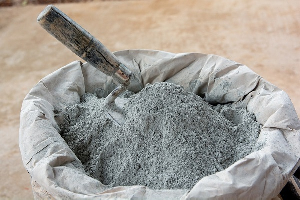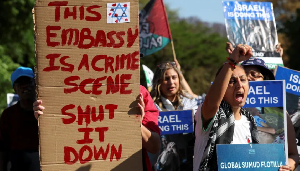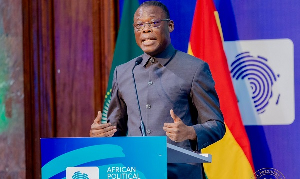Destiny fulfilled; a celebration of life
“Destiny is not a matter of chance; but a matter of choice. It is not a thing to be waited for. It is a thing to be achieved.” For a young boy who walked many miles to school on foot, loved roasted plantain because it was all he could afford and at night rested his head in his palms for a pillow, but who would later learn to fly, serve as advisor to a Prime Minister and have two presidents personally adorn him with awards, is worth applauding for achieving his destiny.
We say farewell with pride because yours was a life well lived. You went through the valleys, yet you climbed to the heights of life. You stood tall as a human being of unique qualities. Your life history tells of great feats and accomplishments. You excelled in every sphere of your life and left behind you a trail of admiration, respect and love for the man you were. Your life confirms that you accomplished your purpose; you fulfilled your destiny.
Michael Akuoku Otu, recipient of the highest state award, The Order of the Star of Ghana, was born in Adukrom on the 25th of October, 1925 to Mr. Ashong Kwame, a herbalist and Madam Ama Tiekubea, a trader and pillar of the Presbyterian Church. He rose to prominence in the military and served in all three arms of the Ghana Armed Forces, starting off as an infantryman and retiring honorably as Air Marshall and Chief of Defence Staff. A brave and disciplined soldier, he served his nation and countrymen in numerous ways. He died on the 8th of October 2006.
Air Marshall M.A. Otu received his early education at the Roman Catholic Senior School at Ashanti Bekwai. After school, he enrolled at Akropong Teacher Training College, but after six months, in 1943, left to join the Gold Coast Regiment in which his elder brother was serving.
He started his military career by serving in the 76 Detachment of the Royal Army Pay corps. In 1946,he was promoted to the rank of Warrant Officer Class1. Seven years later, in 1953, he was one of three Ghanaians sent to Eaton Hall, a very prestigious military academy in the U.K. for officer cadet training. After commission, he served for a year in Germany, attached to the British Regiment of the South Wales Borders. Dada regaled us with laughter of his experiences in Europe as a young, black man; the armoured tanker in which he was, hit an electric installation and when he came out walking, people at the scene were horrified and could not believe their eyes.
On his return, he was posted to the 3rd Battalion, Gold Coast Regiment, at Kaladan Barracks in Tamale and was appointed Platoon Commander, a position he held from August 1953 to January 1957. This was followed by a series of promotions: In January 1957, M.A. Otu was made the Company Commander of the 3rd Battalion. In February of the same year, he became the Intelligence Officer/Assistant Adjutant and then in 1958,was made Adjutant. Later, in July 1959, he gained another promotion to the rank of Quartermaster of the General Headquarters of the Ghana Infantry in Accra and served in this capacity until September 1960, when he was posted to the Congo to serve at the Army Headquarters. In January 1961, a few months after assuming this position, he was asked to proceed with his family to the United Kingdom on a course at the Staff College of Camberley in Surrey.
He returned to Ghana after this course, and was soon promoted to the rank of Lieutenant – Colonel, and posted to the Army Headquarters. In April 1962, M.A. Otu was appointed General Officer Grade One and in October, he was posted to the Ministry of Defence as Staff Officer Grade One and served as head of all the three main branches: DAAG, DAQMG and G Branch. He became Chief of General Staff in October 1962 and stayed at this post until August 1963. He rose to the rank of a full Colonel. By the orders of the Commander-in-Chief, M.A was asked to change his career and take command of the Ghana Air Force, which was then in its formative stages. In fact, he thought this would affect his prospects in the Armed Forces, but after an interview with the Commander-in-Chief, he accepted this new appointment and went into full action. During that period he also briefly took command of the Ghana navy.
It was after he had taken over command of the Air Force that he himself learnt how to fly. He went through the Air Force flying school with incredible feat and qualified as pilot. The President of Ghana, Osagyefo Dr. Kwame Nkrumah personally pinned his flying wings to his chest in recognition of his outstanding performance. In addition, he had to come to grips with taking charge of this new “organization,” as well as commanding a mainly expatriate corps of British and Canadian officers, who were then the flying crew and training officers in the Ghana Air Force.
As Commander of the Air Force from1963 to February 1968, he set up a comprehensive flying training school at Takoradi and a technical school at the Ghana Air Force Base. The flying school produced some of the best pilots in the country. He saw to the training of Ghanaians as training instructors and aircraft captains to take over from the expatriates. Under the command of M.A. Otu, Air Force barracks were built at Accra and Takoradi for Air Force personnel and he also came up with the idea of constructing an airfield at Tamale. This dream, however, became a reality after he left office. Another remarkable contribution of M.A. Otu was the acquisition of Carrabus (STOL) helicopters and the MB326 trainer fighters, which are still in use. Air Marshall Otu and his senior brother, General F.J.A. Otu made military history in Ghana for heading two arms of the Ghana Armed Forces concurrently; while M.A. was Air Force Commander, S.J.A. was Chief of Defence Staff, a position later held also by M.A. late in his military career.
In March 1968, the late M.A. Otu was promoted Lieutenant General and appointed General Officer Commanding/Chief of Defence Staff, Ministry of Defence. He served in this position until November 1968, when he was held incommunicado for an alleged treasonable offence of plotting to return Kwame Nkrumah from exile after his overthrow. The High Court, chaired by Justice Archer, after a thorough trial exonerated him of the charges leveled against him.
The end of this period coincided with the coming into office of the Busia Regime. This civilian regime, finding excellence in M.A., recalled him to duty and was appointed an Advisor to the Prime Minister at the Castle. In November 1969, he returned to the Ministry of Defence, as Chief of Defence Staff As CDS, M.A. Otu is recorded to have introduced better conditions of service for the Ghana Armed Forces and provided improved accommodation for military personnel in Accra and the outstations. Among these is the Apremdu Complex. During his tenure, the military section of the Ministry of Defence was completely reorganized and the Tri-Service concept and Defence Staff Committee were established to handle the complex staff assignments of the time. He remained CDS until he retired honorably from active service in June1971.
Air Marshall Otu’s service and achievements extended beyond the military. In 1959, while waiting to attend Staff College in London, he was attached to The Buckingham Palace as Equerry to Her Majesty, Queen Elizabeth II of England and accompanied the Queen on her first royal visit to Ghana. In January 1967, M.A. Otu was appointed to organize the first Ghana International Trade Fair, which successfully took place in February 1967. He was also chosen to serve on the Board of Ghana Airways in its pioneering days from 1967 to 1968.
Air Marshall Otu was a member of the 1979 Constitutional Commission. He also served as the Military Member of the board that upon government directives instituted national awards to honour distinguished Ghanaians for their services to the nation.
In 2001, in the spirit of reconciliation, a process initiated by the NPP government M.A. Otu was appointed Chairman of the Executive Committee constituted by His Excellency, President John Agyekum Kufour to oversee the exhumation and reburial of the seven generals and colonel who were executed during the P.N.D.C. Regime.
When it came to issues of custom and tradition, M. A. Otu was passionate and believed strongly in supporting and upholding his Ghanaian heritage. He was actively involved in the preservation of the history and development of the Guan people and was a founding member of the Guan Kponkpo/Guan Congress and later became the chairman. He also served on the Okereman Council and was a member of the Mukasa.
M. A. Otu’s hometown, Adukrom, was very dear to his heart and he was devoted to its development. Most modern projects in Adukrom saw the light of day through his tireless efforts; the setting up of Nifa Secondary School, Adukrom Secondary Technical School and the building of Nifa L/A Primary School, the provision of water and electricity, the improvement in the road network and the Ghana Telecom Project, which has improved cellular phone reception, just to mention a few. He certainly played dynamic roles as Chairman of the defunct Town Development Committee of Adukrom. He was chairman of the new Adukrom Bethel Presbyterian church Building Committee and was always available on site or otherwise to guide and support action
It is said that behind every successful man there is a woman. Beatrice Agyepomaa Otu was the lady behind the man we all recognised and admired as a gallant and prominent soldier. Beatrice cared for, nursed, encouraged, supported and lived with Michael Akuoku Otu until June 1996, when she crossed over to eternity, after forty-eight years of married life.
Michael Otu, a young Warrant Officer Class 1, met Beatrice when she was training to become a nurse and got married to her in 1948. Later in 1963, they had a sacramental marriage celebrated to bless their union. The couple was favoured with five children: Abena, Kweku (deceased), Emma, Kwame and Kwadwo (deceased). The couple took good care of several children and other relatives, including their own five children. With the good education and moral training, these children have grown up to be responsible adults occupying various profitable positions in our society.
Mama as most people called her was a pillar of strength and the driving force behind Michael and she offered him her shoulders to lean on through thick and thin. Theirs was a relationship of love, understanding and forgiveness; qualities that kept them together till the end. People who knew the strong bond between them doubted if Michael would survive the pains of his wife’s death, but being the stable person he was, he got his emotions under control and held on for ten more years, even going through another trauma, the death of his son, Kweku. If there is any meeting in the hereafter, then by now, Michael is sitting beside his beloved Beatrice. May their souls rest in peace! Air Marshal M.A Otu was a stalwart. He was gifted and he developed his talents, placed them at the service of mankind and received great honours. M.A Otu has left his footprints on the sands of time and will be remembered by his deeds and great personality. He will be sorely missed by his numerous friends, colleagues and relatives, especially his children; Abena, Emma, Kwame, Fiifi and Maama.
May the Lord grant him eternal rest and let his perpetual light shine upon his soul.
Damirifa due! Nantew yie!
Funeral arrangements for the late Air Marshall M. A. Otu are scheduled for Friday, January 12 & 13, 2007, at Adukrom, Akuapim.
General News of Friday, 22 December 2006
Source: yaw adu-otu (asare@verizon.net)












